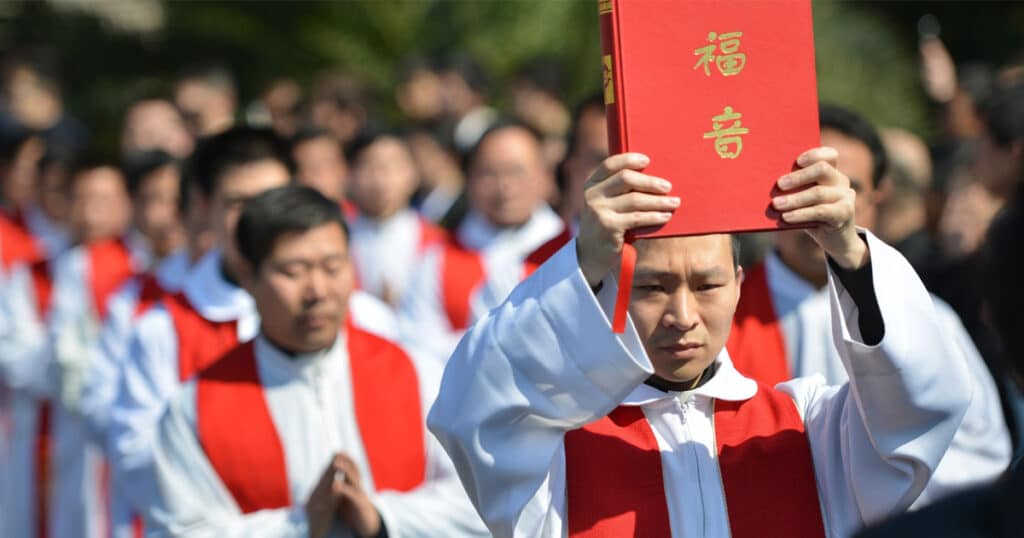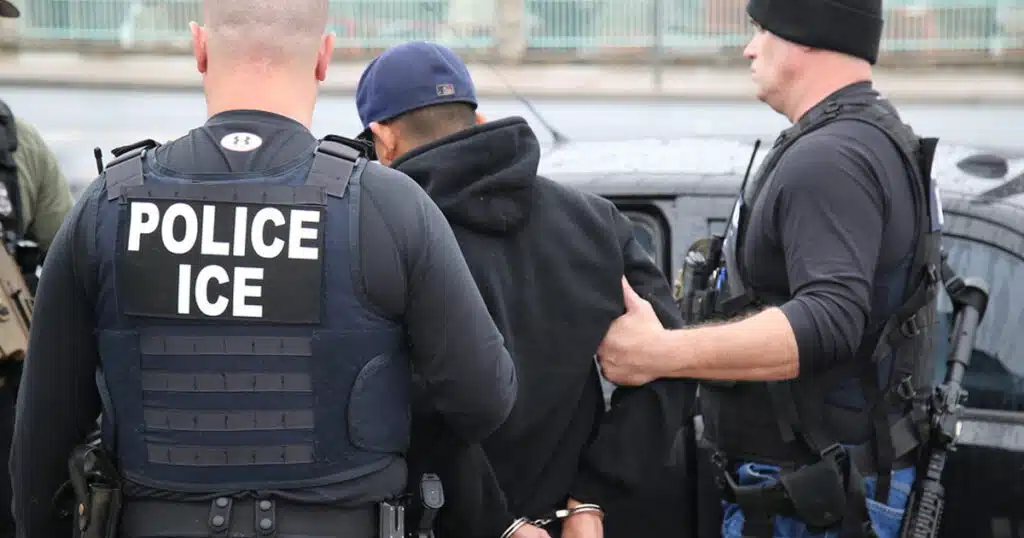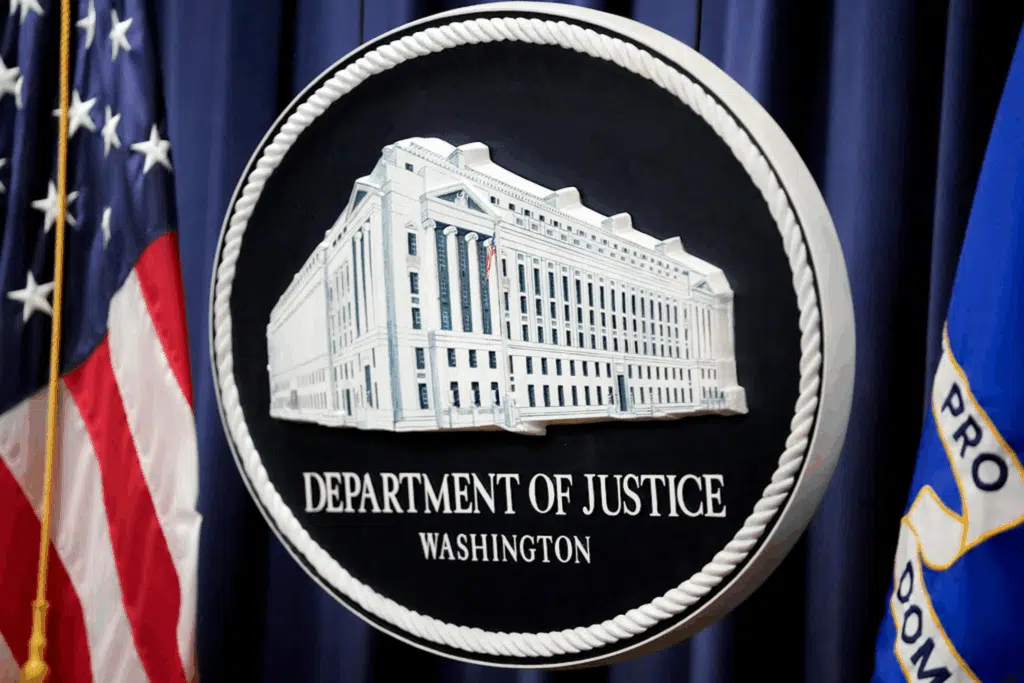
As Refugees Flood Into U.S., Chinese Christians Told To Wait
On Christmas Eve, members of Shenzhen Holy Reformed Church, who fled China several years ago, had their celebrations abruptly cut short.
The congregation had initially sought refuge in South Korea, but was denied a haven there after three years of immigration court proceedings. The next port of call was Thailand, which they hoped would be a peaceful, if temporary, home before being granted sanctuary in the United States. But on December 24, the landlord for the apartments where the 64 church members – roughly half adults and half children – were staying suddenly informed them that Thai police had demanded copies of all their passports, IDs, and visas.
Their visas had expired in October after the Chinese Embassy in Bangkok insisted that all the church members present them for “examination” when they attempted to renew them, advocates for the church told RealClearPolitics.
If church members refused to produce the documents, their landlord directed them to leave immediately – within hours – even though their rent had been paid through January. There was a greater worry, too. The church members knew that Thai authorities had a history of working with the Chinese government to draw Chinese nationals out of hiding, arrest them, and send them back to their homeland.
The sudden demand for documents upended the planned religious services or Christmas Day festivities. Instead, the congregation spent the holidays desperately searching for new housing.
“Obviously, they had to run – the apartment owners said they couldn’t stay even though we had already paid for the whole month of January. But on Christmas Eve they had to evacuate,” Bob Fu, a Chinese American pastor who founded ChinaAid, an organization providing legal services to Chinese Christians, told RealClearPolitics. “There were thousands of dollars wasted, and it was very stressful, but they found their way to a safe haven.”
Living at the mercy of their landlords in fear of foreign government authorities is the new daily reality for the small congregation living in legal limbo in Thailand.
But it doesn’t have to be this way, according to human rights and religious freedom advocates. The United States could grant the church members immediate emergency asylum, as it has done for tens of thousands of Ukrainians fleeing their war-ravaged country and the first group of Afghans airlifted into the United States amid the chaotic U.S. evacuation in August 2021.
Just this month, President Biden announced plans to allow Venezuelans, Nicaraguans, and Cubans fleeing persecution priority asylum status as long as they arrived by plane and had private sponsors ready to help them resettle.
When it comes to Chinese Christians trapped in limbo, the Biden administration is balking, while offering no explanation for the dramatically different treatment of these groups of foreign nationals seeking asylum. Human rights advocates believe they already have the answer: The Biden administration is wary of further rocking the boat with China amid efforts to repair basic lines of communication.
That calculation, even if it proves temporary, is a break from America’s long tradition of standing for religious freedom at home and abroad. Advocates also warn that U.S. indifference to the plight of the exiled Chinese Christians puts them in imminent danger of arrest and deportation back to China.
Crackdown Prompts Congregation To Flee
The Holy Reformed Church, founded in 2012, previously existed relatively peacefully for several years in the city of Shenzhen on the Chinese mainland bordering Hong Kong. Its pastor, Pan Yongguang, was ordained by the Philadelphia Bible Reformed Church of the Presbyterian Church in America, the second largest Presbyterian denomination in the U.S. (PCA is one-third the size of Presbyterian Church USA. Although the more doctrinally conservative, it has been growing rapidly while the venerable mainline PCUSA has been shrinking.)
To add to the American connection, Pastor Pan and his flock were referred to by some advocates as the “Mayflower Church,” inspired by the Pilgrims who left their homeland for the New World four centuries ago. The nickname stuck. “Even the children were familiar with the history of the Mayflower,” Pan noted last year. “Our faith is the same as the Mayflower’s; our experience is also similar to theirs.”
Although Chinese Christians are allowed to worship only in churches affiliated with Communist Party-controlled religious groups, for decades the authorities tolerated these independent “house churches.”
After President Xi Jinping came to power in 2013, however, the house churches have been driven further underground as state authorities stepped up surveillance of all religious practices, including unregistered churches’ activities.
According to a 2017 study by Freedom House, a D.C.-based nonprofit that advocates for democratic reforms and human rights around the world, at least 100 million Chinese citizens belong to religious groups facing “high” or “very high” levels of persecution. These include Christians, Tibetan Buddhists, members of the Falun Gong – and Uyghur Muslims, whose extreme persecution has been labeled an attempted “genocide” by the U.S. State Department.
The forced detention, relocation, sterilization and other abuses of some 1 million Uyghurs has generated the most international headlines in recent years as China has tightened its grip on Xinjiang, a once autonomous region in northwest China and the Uyghur homeland. But the Xi regime is also making life extremely difficult for most believers who continue to try to practice their religious faith independent from government control and intrusion.
The state-sanctioned Christian churches must abide by strict guidelines imposed by Beijing for sermons, and teachings must be in line with the Communist Party’s ideals. The move is part of the government’s “Principle for Promoting Chinese Christianity in China for the Next Five Years” plan, issued in 2018, which details how the Chinese government aims to “Sinicize” or adapt Christianity to China’s communist society. Within hours of the plan going public, Bibles were seized and banned, and digital versions can no longer be found online. Still, many churches, including the Mayflower Church, chose to defy the new laws and have even engaged in direct public protests, further angering authorities.
Despite Xi’s crackdown, or possibly because of it, underground churches have proliferated in recent years. Some estimates put the underground Christian church movement’s members in the tens of millions, likely outnumbering those in the official churches. Dissidents continue to pray together and protest at their own peril.
Before Pan and his congregation fled China, authorities hauled the pastor in for questioning several times, according to Fu. He became a more frequent target of police after they learned that the congregation had officially affiliated with the Presbyterian Church in America. Pan also drew the ire of authorities for refusing to allow them to install facial recognition cameras in places of worship. The pastor began to think about leaving China after a friend of the same denomination was arrested. The plans accelerated after millions protested in Hong Kong in 2019 amid Beijing’s new tighter city control. Pan decided to hold a vote of all church members about leaving China; most chose to flee.
China’s Transnational Intimidation
For a time, Mayflower Church found refuge on Jeju Island in South Korea, one of the only places Chinese citizens are allowed entry without a visa. But the Chinese government soon located them and began a harassment campaign. Chinese police started questioning church members who remained in China, family members of those who left, and some congregants whom South Korean immigration authorities tracked down and sent back home, where they found themselves under constant surveillance by police. One woman was refused entry into South Korea and placed under house arrest in Shenzhen.
Chinese authorities even sought to locate Pan and others by forcing their family members in China to urge the asylum seekers to reactivate their WeChat accounts, according to Fu’s testimony to the U.S. Commission on Religious Freedom in December.
Beginning in March 2021, Chinese authorities escalated their campaign of harassment and intimidation. Mayflower Church members living on Jeju Island received anonymous menacing phone calls accusing them of “treason” and “subversion of state power,” demanding they return to China immediately.
After exhausting the South Korean asylum system, the congregation voted to leave South Korea for Bangkok where they could apply for U.N. High Commission for Refugee status, a process that could lead to legal asylum in the United States or another Western country. The congregation nervously moved forward with the plan even though they knew it was risky.
The Chinese government has a troubling history of abducting its citizens who flee the country, several of them in Thailand. In 2015, the Chinese government kidnapped China-born Gui Minhai, a Swedish citizen and author of some 200 books, many related to Chinese politics and Chinese politicians. The Chinese authorities held him for three months but kept silent until releasing a video of him “confessing” that he had returned to China of his own volition and surrendered himself to authorities. The same year, two Chinese citizens who had escaped to Thailand were captured by Thai authorities and forcibly returned to China. According to some estimates, more than 10,000 individuals have been forcibly returned to China since 2014.
As several media outlets, including the Wall Street Journal and the Associated Press, have shined a spotlight on the Mayflower Church’s plight in recent months, Chinese authorities have stepped up their intimidation and threats against family members back in China, church members report. Pastor Pan’s father has been repeatedly threatened.
“The Chinese security [police] are trying to use their family members back in China as hostages to force them to go back,” Fu told RCP. “They are making that very clear, saying their children, [Mayflower Church members] who are living in Thailand or South Korea are traitors of China.”
If they follow orders and return, Mayflower church members are convinced they will be imprisoned – or worse.
Mayflower Church allies maintain that the logical home for this group of religious refugees is the United States, where several laws exist to help protect those facing severe religious persecution abroad. With the help of ChinaAid, a church in Tyler, Texas, has been underwriting the Mayflower congregation’s living expenses and has agreed to sponsor them if and when they are allowed entry to the United States.
The Biden administration has refused to grant the church members immediate asylum, known as humanitarian parole. The emergency immigration status allows foreign nationals facing severe threats or violence to effectively cut to the head of the line in the legal immigration application process and enter America legally, although only temporarily. Advocates believe that the 64 members of the Mayflower Church should be treated at least as well as Ukrainians fleeing their war-ravaged country or Venezuelans escaping their country for the safety and stability of the United States. Under U.S. law, they point out, the congregation qualifies for humanitarian protection because they face an imminent threat of abduction and repatriation to China, where they will undoubtedly be imprisoned and tortured.
Over the last year and a half, tens of thousands of Ukrainians fleeing war, as well as Afghans the U.S. government airlifted out of Kabul in the August 2021 frenzy, have been granted asylum in the U.S. and allowed to resettle here. In addition, this month the Department of Homeland Security announced that a parole process for many Venezuelans will be extended to vetted nationals of Cuba, Haiti, and Nicaragua and their immediate family members. President Biden earlier this month announced that up to 30,000 refugees a month from these countries could come to stay and work for up to two years as long as they arrive by airplane and can secure a sponsor for financial support.
Just last week, the State Department announced yet another new program worldwide that attempts to increase private sponsorship and resettlement for all refugees. Under this new “Welcome Corps,” Biden aims to resettle 125,000 refugees from global hot spots into the United States each year.
The State Department calls it the “boldest innovation in refugee resettlement in four decades.” The only catch: Each refugee must already have UNHCR status (part of the refugee applicant pipeline that includes those who have cleared some initial vetting and are waiting for final approval), and at least five private sponsors must show they have the funds to underwrite applicants’ living costs for at least a year.
The announcement left advocates for the Mayflower Church perplexed. The Texas church that has been sponsoring the exiled group from China for more than a year has committed to continue underwriting their resettlement if and when they are allowed into the United States.
“The [U.S.] allows 250,000 illegal immigrants to cross the border each month, getting an iPhone, living in a [high-priced] hotel in New York City, they get all the social welfare benefits – everything,” Fu said. “And these law-abiding Chinese Christians are still being blocked, prevented from being accepted?”
Instead of waiting in Thailand under threat of repatriation to China, Fu argued that the Mayflower members could easily take flights to Mexico and cross the border the same way millions of immigrants from Central and South America have over the last few years. Instead, they are choosing to respect U.S. immigration laws and come legally. If allowed to resettle in the United States, the group of Chinese Christians would bring with them “faith, freedom, and joy – and a hardworking ethic.”
Former Virginia Rep. Frank Wolf, a champion of human rights and religious freedom during his three decades in Congress, has helped several persecuted Chinese dissidents emigrate and resettle in the United States over the last several decades. While those were individual cases, Wolf believes it’s imperative to grant the Mayflower Church members as a group emergency asylum because they have become a top target of the long arm of Chinese authorities and face immediate imprisonment, torture, or death if returned to China.
Wolf suggests that the reason for any asylum impasse or delay is two-fold: State Department officials have an inexplicable bias against Christians, and the Biden administration doesn’t want to create any more hostilities with China right now.
Relations between the U.S. and China are at a pivotal crossroads, at a time when the administration is focused on monumentally important geopolitical issues. Secretary of State Antony Blinken plans a trip to China in early February to re-open basic communication lines with Beijing. Blinken’s agenda will include efforts to deter Chinese aggression against Taiwan and a warning to China not to aid Russia in its war with Ukraine.
Refugee Backlog
RCP submitted several detailed questions to the State Department about the Mayflower Church members’ plight and whether the agency’s new “Welcome Corps” program could help expedite their entry to the United States as refugees.
A State Department spokesperson said the agency does not comment on individual refugee cases and directed questions about humanitarian parole and asylum decisions to the Department of Homeland Security. The spokesperson noted that the five private sponsors required for the “Welcome Corps” program can be any adults who meet the requirements, including members of faith-based organizations, explaining that the new private sponsorship program is part of the administration’s broader efforts to rebuild and modernize the U.S. refugee application system.
“This includes separate work underway to increase refugee admissions, process refugee cases more quickly, and resolve many of oldest cases pending resolution,” the spokesperson said.
Citing progress in those efforts, the official said that last quarter DHS interviewed more than 20,000 refugee applicants overseas – more than any quarter since the Obama administration.
“Refugee admissions levels to date are a lagging indicator of our progress, and we expect to see the impact of our work to enhance the USRAP demonstrated through increased refugee admissions over time,” the spokesperson added.
While ambitious, the programs could eventually help Mayflower Church members – if they can wait it out before being picked up by Chinese authorities. Human rights officials within the Biden administration have taken an interest in the Mayflower Church’s plight. Wolf, who serves as one of nine USCIRF commissioners, heaped praise on Rashad Hussain, Biden’s ambassador at large for International Religious Freedom, for efforts try to help the church gain entry to the United States.
“Ambassador Hussain has been very good – every time we’ve called him, and I sincerely think that he’s doing everything he can, but the State Department has so many competing interests,” Wolf said.
At least in theory, State’s new “Welcome Corps” could help facilitate the church members’ refugee status. Still, Wolf worries it will take too much time if the congregants don’t receive an immediate priority.
“Regardless, I think they ought to let these people in,” Wolf said. “The Chinese never give up – we’ve seen plenty of stories that they go [secretly] arrest people and fly them back to China, and they’re never seen again.”
Advocates Press for U.S. Action
In addition to giving Mayflower Church members’ asylum applications top priority, Fu also recommended that USCIRF and the Congressional-Executive Commission on China, or CECC, should create a joint database to better track cases of the CCP’s acts of “transnational repression toward religious freedom and human rights expatriates and advocates.” Such a partnership, he said, could better inform the FBI’s task force on transnational repression, which is already up and running.
At the same hearing, Wolf urged the State Department to send U.S. embassy diplomats in Thailand to regularly visit the Mayflower church members as a sign of U.S. support for their plight.
If the Thai government refuses protection for the group from UNHCR, the UN refugee agency, Wolf argues that another country should provide temporary resettlement to allow for the more lengthy and extensive U.S. processing time.
Wolf pointed to the Constitution’s First Amendment pledge not to “impede the free exercise of religion” as an ideal designed for the U.S. to uphold, not only for its citizens but as a standard for all nations to work to achieve.
“The words promising to uphold religious freedom … are a covenant, not only with the people of Philadelphia but with the entire world. That covenant has been weakened, but we should always stand for the persecuted, whether in Nigeria, in China, Nicaragua, and Cuba – everywhere in the world.”
This article was originally published by RealClearPolitics and made available via RealClearWire.



